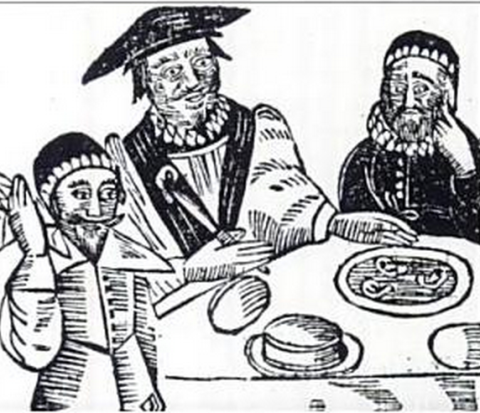
William Prynne (1600-1669) was an English lawyer and writer, famous for his provocative and controversial essays. One of the most Puritan of the Puritans, Prynne was not afraid to take aim at popular figures, culture or conventions.
One of Prynne’s earliest and best known works was Histriomastix, a 1633 attack on just about anything considered fun. Historiomastix strongly criticised parties, masquerade balls, country fairs, mixed dancing, feast days, wakes, sports, even hairstyles and colourful stained-glass windows.
Much of this particular text, however, is a condemnation of theatrical performances and those responsible for them. Plays, Prynne claims are “the chief delight of the Devil”, wanton and immoral displays of debauchery filled with:
“…amorous smiles and wanton gestures, those lascivious complements, those lewd adulterous kisses and embracements, those lustful dalliances, those impudent, immodest painterly passages… they are the very schools of bawdery, real whoredoms, incests, adulteries, etc.”
As to those who regularly attend the theatre, they are:
“…adulterers, adulteresses, whoremasters, whores, bawds, panders, ruffians, roarers, drunkards, prodigals, cheaters, idle, infamous, base, profane, and godless persons.”
“Women actors, notorious whores.”
This anti-thespian tirade soon got William Prynne into trouble. One woman who quite enjoyed masked balls, mixed dancing and the occasional acting role was Henrietta Maria, wife of Charles I.
The queen had appeared in a speaking role in a prominent play not long after the publication of Histriomastix, and she took Prynne’s slurs personally. In 1634, Prynne was hauled before the star chamber, charged with seditious libel against the queen and others, and found guilty. He was fined £5000, stripped of his academic degrees, given two days in the pillory and sentenced to have the tops of his ears clipped off with shears.
If that wasn’t enough, hundreds of copies of Histriomastix were rounded up and burned before Prynne’s eyes as he languished in the pillory.
Source: William Prynne, Histriomastix, London, 1633. Content on this page is © Alpha History 2019-23. Content may not be republished without our express permission. For more information please refer to our Terms of Use or contact Alpha History.
